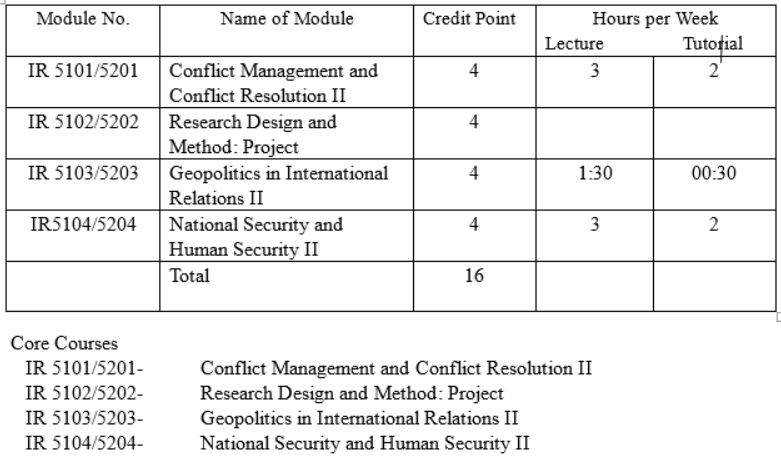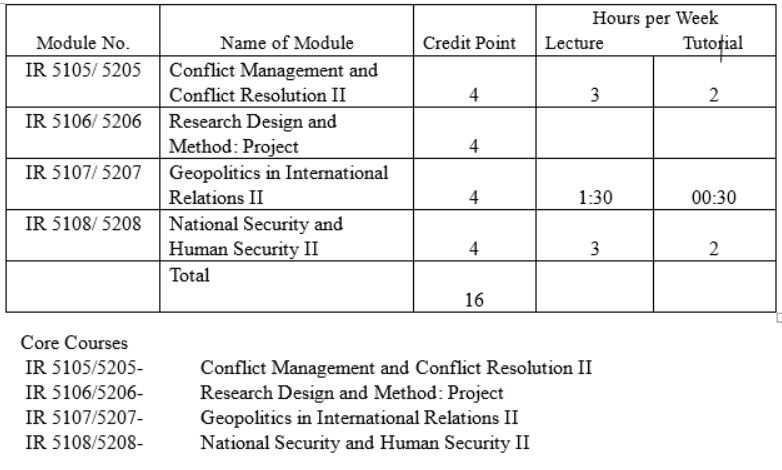Third Year (Honours & Qualifying)
B.A (HONS & MA(Q)) Third Year ( IR Specialization ) SEMESTER I
IR – 5101/5201 Conflict Management and Conflict Resolution I
Course Description
The course aims to introduce conceptual framework on conflict management and resolution, and role of states, and non-state actors in conflict resolution .It also aims to provide students with an understanding of theory and practical cases to highlight nature of solutions of international conflicts.
Learning Outcomes
At the end of the semester, students will be able
- to understand theoretical perspectives on conflict management and resolution
- to analyze basic causes of conflict
- to identify approaches in conflict resolution with cases
Class Organization
The course is divided into 16 weeks. In each week three hours will be for interactive lectures and two hours will be class works.
Grading
Classwork (Attendance, assignment, Quiz) – 35%
Final exam – 65% (Closed Book)
Final Exam
The final exam will cover 65% of the overall course grade and will be held in Week 16. It will be a comprehensive exam covering the entire semester. It will be a closed book exam.
Attendance and Presentation
Students will be assessed on their attendance, quiz, and assignment for 35% of the course grade. The assignment will include a group presentation and paper.
IR-5101/5201 Geopolitics and International Relations I
Description of the course
Geopolitics, traditionally the study of power relations across geographic space, has transformed to embrace the cyber domain and the geopolitics of sustainability. Critical issue areas such as the geopolitical impacts of climate change and resource competition are studied alongside enduring classical themes, notably sea power and the return of great power rivalry. The geo-strategies employed by global and regional actors, including China, the United States, and Russia across global regions, are examined through the lens of geopolitical theory. This analytical approach is accompanied by historical and regional-cultural contexts, providing students with knowledge and understanding of the dynamics of contemporary geopolitical challenges.
Learning Outcomes
After completing the module successfully, the students will be able to have the following competences:
- Becoming familiar with socio-economic, political, and environmental processes in contemporary global political issues;
- Using key social science and geographic concepts to analyze the processes which shape and reshape these issues;
- Thinking critically about contemporary global political issues and explore how to handle them from the perspective of IR;
- Understanding of central geopolitical perspectives for dimensions in disaster situations
Teaching Methodology
The cause is taught with four specific teaching methods: lecturing, group discussions in the class, contributing tutorial tests and presentations. The course combines with 14 lecturers (2 hours for each lecture) in one semester. Main concepts and certain geopolitical theories are basically emphasized in each lecture.
Assessment
Class work (tutorials, group presentations, assignments) – 25%
Attendance – 10%
Exam paper _ 65%
Total – 100%
IR – 5104/5204 National Security and Human Security I
Course description
The course is divided into four parts. The first part deals with the major theories of international relations and their theoretical perceptions on security. The second parts focuses on the collective security involving the study of the regional and international security organizations. The third parts explores the security paradigm shift and non-traditional security issues. Finally, the course concludes with the study of human security.
Class Organization
These four parts will be covered within the sixteen weeks lecturers. Each week will involve: 3 hours lecture and 2 hours discussion.
Learning Outcomes
This course explores the security studies through two different domains: national security and human security. It will take theoretical understanding of the security to examine how the actors and institutions have been working in the international relations. It will consider the changing pattern of security studies and the significant of people-centered security approach. The students will be expected to gain a better understanding on the security studies through different theoretical perspectives at the end of the semester.
Materials: “Paul D. Williams. ‘Security Studies: An Introduction’, Security Studies: An Introduction. London: Routledge (2013) “ will be the major reading for every week. Other relevant readings such as articles will be provided for every week.
Assessments:
- Article review: 20% (Students have to submit weekly article review)
- Multiple Choice Exam: 15% ( this assessment will be done after week 14 lecture)
- Exam: 65%
B.A (HONS & MA(Q)) Third Year ( IR Specialization ) SEMESTER II

IR 5105/ 5205-Conflict Management and Conflict Resolution II
Course Description
The course aims to provide students with an understanding of models of conflict resolution , mediation, and nature of international conflicts .It also aims to examine strategies of mediation and international conflict resolution with practical cases.
Learning Outcomes
At the end of the semester, students will be able
- to understand models of international conflict resolution
- to distinguish tension, disputes and conflict in international relations
- to identify strategies of mediation with cases
Class Organization
The course is divided into 16 weeks. In each week three hours will be for interactive lectures and two hours will be class works.
Grading
Classwork (Attendance, assignment, Quiz) – 35%
Final exam – 65% (Closed Book)
Final Exam
The final exam will be in week 16 and will cover 65% of the overall course grade. It will be a comprehensive exam covering the entire semester. It will be a closed book exam.
Attendance and Presentation
Students will be assessed on their attendance, quiz, and assignment for 35% of the course grade. The assignment will include a group presentation and paper.
IR- 5107/5207 Geopolitics and International Relations II
Course Description and Objectives
Generally, Geopolitics is a broad spectrum of studying the geographic perspective to aid in understanding the dynamics of contemporary global politics, including issues related to global power struggles, nationalist conflicts, border dynamics, the global military actions over terrorism, peace movements, resource conflicts, and the politics of climate change. This course aims to provide the students with a greater understanding of the subdivision of the international politics called “geopolitics”, how it works, how it can be used to assess the capabilities of a state, a region, or a union of states in terms of their domestic and foreign policy orientations in international relations. In this course, different aspects of the geopolitical approach will be analysed the changing context of geographical, cultural, and political divergent.
Learning Outcomes
By the end of the course, the students are expected to have a greater knowledge on how to assess geopolitical issues, improve their understanding of foreign policy and international system analyses. It is also hoped that students will have a firm grasp of conceptual & theoretical explorations of the core concepts of strategy and related debates and controversies from a global perspective based on their sound knowledge and understanding. Moreover, they are able to analyze the geopolitical principles and strategies within the international relations system with well-developed judgement.
Teaching Methodology
The cause is taught with four specific teaching methods: lecturing, group discussions in the class, contributing tutorial tests and presentations. The course combines with 14 lecturers (2 hours for each lecture) in one semester. Main concepts and certain geopolitical theories are basically emphasized in each lecture.
Assessment
Class work (tutorials, group presentations, assignments) – 25%
Attendance – 10%
Exam paper _ 65%
Total – 100%
IR 5108/5208- National Security and Human Security II
Course description
The course is divided into three parts. The first part explores the meaning of national security in relation to the nature of the state, the nature of threats and individual security. The second parts focuses on developing a national security policy. The third parts aims to study human security.
Class Organization
These three parts will be covered within the sixteen weeks lecturers. Each week will involve: 3 hours lecture and 2 hours discussion.
Objectives and learning outcomes
This course aims to improve students’ in depth understanding on security and its components and at the end of the semester, students are expected to gain the knowledge of national security and human security from various aspects.
Materials: “People, States and Fear: The National Security Problem in International Relations” by Barry Buzan and other relevant readings such as articles will be provided for every week.
Assessments:
- Policy Brief ( Defense White Paper): 15% ( Students will have to submit the policy brief on Myanmar Defense White Paper)
- Major Essay: 20% ( 1500 words essay will have to be submitted before the exam)
- Exam: 65%

